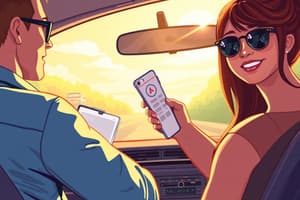Podcast
Questions and Answers
What should you do when a law enforcement officer is directing traffic?
What should you do when a law enforcement officer is directing traffic?
Follow their directions.
What is the best way to inform other drivers of your intention to turn or change lanes to pass?
What is the best way to inform other drivers of your intention to turn or change lanes to pass?
Use your signal lights well in advance.
What should you do if you notice a dangerous situation at a railroad crossing?
What should you do if you notice a dangerous situation at a railroad crossing?
Look for a blue emergency notification system sign and call the toll-free number to alert the railroad.
What steps should you take to make a left turn at an intersection?
What steps should you take to make a left turn at an intersection?
Where do most accidents occur?
Where do most accidents occur?
What should you do if you take the wrong exit on the interstate?
What should you do if you take the wrong exit on the interstate?
What should you do if your vehicle has a blowout?
What should you do if your vehicle has a blowout?
What minimum amount of automobile liability insurance is required in Mississippi?
What minimum amount of automobile liability insurance is required in Mississippi?
When parallel parking downhill, which direction should you turn your wheels before setting the parking brake?
When parallel parking downhill, which direction should you turn your wheels before setting the parking brake?
On a two-way, four-lane street, which lane should you use to make a left turn?
On a two-way, four-lane street, which lane should you use to make a left turn?
What does a flashing yellow arrow mean?
What does a flashing yellow arrow mean?
When are paved roads likely to be their slickest?
When are paved roads likely to be their slickest?
If you are traveling in the right lane of an interstate highway, what adjustments should you make when other vehicles are entering the highway?
If you are traveling in the right lane of an interstate highway, what adjustments should you make when other vehicles are entering the highway?
What does 'over-driving' your headlights mean?
What does 'over-driving' your headlights mean?
What strategies should drivers follow when traveling long distances?
What strategies should drivers follow when traveling long distances?
When you overtake another vehicle at night, why should you use your low beams?
When you overtake another vehicle at night, why should you use your low beams?
What should you do if you are being overtaken by an emergency vehicle with flashing emergency lights?
What should you do if you are being overtaken by an emergency vehicle with flashing emergency lights?
Why should you use your turn signals well in advance of a turn?
Why should you use your turn signals well in advance of a turn?
When exiting from the interstate, when should you be in the correct lane?
When exiting from the interstate, when should you be in the correct lane?
What should you do before backing out of a parking space?
What should you do before backing out of a parking space?
What should you do if your vehicle becomes stranded on a railroad track?
What should you do if your vehicle becomes stranded on a railroad track?
Why are rear-end collisions extremely dangerous?
Why are rear-end collisions extremely dangerous?
Study Notes
Traffic Direction and Signals
- Follow directions from law enforcement officers directing traffic without exception.
- Use signal lights to notify other drivers of intentions to turn or change lanes well in advance.
Railroad Safety
- In emergencies at railroad crossings, look for a blue emergency notification sign and call the designated number to alert the railroad.
- If stranded on railroad tracks, exit the vehicle immediately.
Making Turns and Lane Changes
- Know your desired turn beforehand and signal accordingly; position your vehicle in the correct lane early.
- Observe all surroundings before changing lanes or turning; do not rely on other drivers to see you.
- Slow down before reaching intersections, maintain a consistent speed during the turn, and do not shift gears or use brakes excessively.
Accident Prone Areas
- Most traffic accidents occur at intersections, requiring heightened awareness.
Correcting Routes When Lost
- If you take the wrong exit on the interstate, do not stop or reverse. Continue to the next exit.
Vehicle Emergencies
- In the event of a tire blowout, do not slam on brakes; ease off the accelerator and brake gently.
Insurance Requirements
- Mississippi requires minimum automobile liability insurance coverage of $25,000 for property damage and $50,000 for bodily injury.
Parking Guidelines
- When parallel parking downhill, turn your wheels toward the curb before setting the parking brake.
Turning Left
- Use the left lane or lanes marked with a left turn arrow when making a left turn on a two-way, four-lane street.
Traffic Signals
- A flashing yellow arrow allows you to turn in the arrow’s direction while requiring you to yield to oncoming traffic.
Road Conditions
- Paved roads are slickest during the first few minutes of rain or drizzle.
Merging on Highways
- Merge left safely when vehicles are entering the right lane of an interstate to ensure their safe entry.
Headlight Usage
- "Over-driving" your headlights means driving too fast to stop within the visible distance, risking accidents.
Long-Distance Driving Strategies
- Take breaks every 100 miles, avoid following the same vehicle, and keep your eyes actively moving to prevent fatigue.
Night Driving Considerations
- Switch to low beams when overtaking another vehicle at night to avoid blinding other drivers.
Emergency Vehicle Protocol
- Pull over to the right shoulder when an emergency vehicle approaches with flashing lights, merging into another lane if necessary.
Proper Signaling
- Signal at least 100 feet prior to turning to provide adequate notice to drivers behind you.
Interstate Exiting
- Be in the correct lane at least a quarter mile before your exit to ensure a safe exit.
Backing Out Safely
- Always check for a clear path and look back before backing out of parking spaces to avoid collisions.
Studying That Suits You
Use AI to generate personalized quizzes and flashcards to suit your learning preferences.
Description
Prepare for the Mississippi DMV driving test with this practice quiz. This quiz includes important traffic signals and law enforcement instructions that every driver should know. Test your knowledge and get ready to pass your permit exam.




